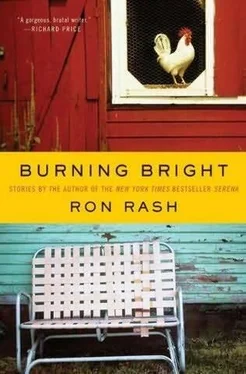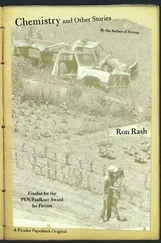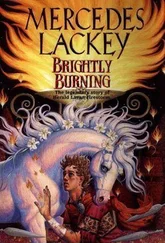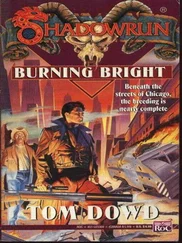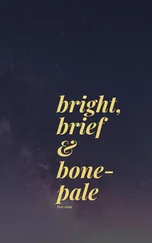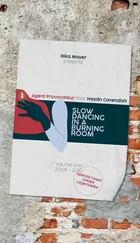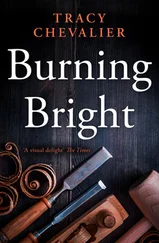“You can lay that trowel down,” a voice behind Jesse said. “Then raise your hands.”
Jesse turned and saw a man in a gray shirt and green khakis, a gold badge on his chest and U.S. Park Service patch on the shoulder. Short blond hair, dark eyes. A young man, probably not even thirty. A pistol was holstered on his right hip, the safety strap off.
“Don’t get up,” the younger man said again, louder this time.
Jesse did as he was told. The park ranger came closer, picked up the backpack, and stepped away. Jesse watched as he opened the compartment with the ginseng root, then the smaller pouch. The ranger took out the.32-20 and held it in his palm. The gun had belonged to Jesse’s grandfather and father before being passed on to Jesse. The ranger inspected it as he might an arrowhead or spear point he’d found.
“That’s just for the snakes,” Jesse said.
“Possession of a firearm is illegal in the park,” the ranger said. “You’ve broken two laws, federal laws. You’ll be getting some jail time for this.”
The younger man looked like he might say more, then seemed to decide against it.
“This ain’t right,” Jesse said. “My daddy planted the seeds for this patch. That ginseng wouldn’t even be here if it wasn’t for him. And that gun, if I was poaching I’d have a rifle or shotgun.”
What was happening didn’t seem quite real. The world, the very ground he stood on, felt like it was evaporating beneath him. Jesse almost expected somebody, though he couldn’t say who, to come out of the woods laughing about the joke just played on him. The ranger placed the pistol in the backpack. He unclipped the walkie-talkie from his belt, pressed a button, and spoke.
“He did come back and I’ve got him.”
A staticky voice responded, the words indiscernible to Jesse.
“No, he’s too old to be much trouble. We’ll be waiting on the logging road.”
The ranger pressed a button and placed the walkie-talkie back on his belt. Jesse read the name on the silver name tag. Barry Wilson.
“You any kin to the Wilsons over on Balsam Mountain?”
“No,” the younger man said. “I grew up in Charlotte.”
The walkie-talkie crackled and the ranger picked it up, said okay, and clipped it back on his belt.
“Call Sheriff Arrowood,” Jesse said. “He’ll tell you I’ve never been in any trouble before. Never, not even a speeding ticket.”
“Let’s go.”
“Can’t you just forget this,” Jesse said. “It ain’t like I was growing marijuana. There’s plenty that do in this park. I know that for a fact. That’s worse than what I done.”
The ranger smiled.
“We’ll get them eventually, old fellow, but their bulbs burn brighter than yours. They’re not big enough fools to leave us footprints to follow.”
The ranger slung the backpack over his shoulder.
“You’ve got no right to talk to me like that,” Jesse said.
There was still plenty of distance between them, but the ranger looked like he contemplated another step back.
“If you’re going to give me trouble, I’ll just go ahead and cuff you now.”
Jesse almost told the younger man to come on and try, but he made himself look at the ground, get himself under control before he spoke.
“No, I ain’t going to give you any trouble,” he finally said, raising his eyes.
The ranger nodded toward the logging road.
“After you, then.”
Jesse moved past the ranger, stepping through the broom sedge and past the ruined chimney, the ranger to his right, two steps behind. Jesse veered slightly to his left, moving so he’d pass close to the old well. He paused and glanced back at the ranger.
“That trowel of mine, I ought to get it.”
The ranger paused too and was about to reply when Jesse took a quick step and shoved the ranger with two hands toward the well. The ranger didn’t fall until one foot went through the rotten tin, then the other. As he did, the backpack dropped from his hand. He didn’t go all the way through, just up to his arms, his fingernails scraping the tin for leverage, looking like a man caught in muddy ice. The ranger’s hands found purchase, one on a hank of broom sedge, the other on the metal’s firmer edging. He began pulling himself out, wincing as the rusty tin tore cloth and skin. He looked at Jesse, who stood above him.
“You’ve really screwed up now,” the ranger gasped.
Jesse bent down and reached not for the younger man’s hand but his shoulder. He pushed hard, the ranger’s hands clutching only air as he fell through the rotten metal, a thump and simultaneous snap of bone as he hit the well’s dry floor. Seconds passed but no other sound rose from the darkness.
The backpack lay at the edge and Jesse snatched it up. He ran, not toward his farmhouse but into the woods. He didn’t look back again but bear-crawled through the ginseng patch and up the ridge, his breaths loud pants. Trees thickened around him, oaks and poplars, some hemlocks. The soil was thin and moist, and he slipped several times. Halfway up the ridge he paused, his heart battering his chest. When it finally calmed, Jesse heard a vehicle coming up the logging road and saw a pale-green forest service jeep. A man and a woman got out.
Jesse went on, passing through another patch of ginseng, probable descendants from his father’s original seedlings. The sooner he got to the ridge crest, the sooner he could make his way across it toward the gorge head. His legs were leaden now and he couldn’t catch his breath. The extra pounds he’d put on the last few years draped over his belt, gave him more to haul. His mind went dizzy and he slipped and skidded a few yards downhill. For a while he lay still, his body sprawled on the slanted earth, arms and legs flung outward. Jesse felt the leaves cushioning the back of his head, an acorn nudged against a shoulder blade. Above him, oak branches pierced a darkening sky. He remembered the fairy tale about a giant beanstalk and imagined how convenient it would be to simply climb off into the clouds.
Jesse shifted his body so his face turned downhill, one ear to the ground as if listening for the faintest footfall. It seemed so wrong to be sixty-eight years old and running from someone. Old age was supposed to give a person dignity, respect. He remembered the night the searchers brought his great-aunt out of the gorge. The men stripped off their heavy coats to cover her body and had taken turns carrying her. They had been silent and somber as they came into the yard. Even after the women had taken the corpse into the farmhouse to be washed and dressed, the men had stayed on his great-aunt’s porch. Some had smoked hand-rolled cigarettes, others had bulged their jaws with tobacco. Jesse had sat on the lowest porch step and listened, knowing the men quickly forgot he was there. They did not talk of how they’d found his great-aunt or the times she’d wandered from her house to the garden. Instead, the men spoke of a woman who could tell you tomorrow’s weather by looking at the evening sky, a godly woman who’d taught Sunday school into her seventies. They told stories about her and every story was spoken in a reverent way, as if now that his great-aunt was dead she’d once more been transformed back to her true self.
Jesse rose slowly. He hadn’t twisted an ankle or broken an arm and that seemed his first bit of luck since walking into the gorge. When Jesse reached the crest, his legs were so weak he clutched a maple sapling to ease himself to the ground. He looked down through the cascading trees. An orange and white rescue squad van had now arrived. Workers huddled around the well, and Jesse couldn’t see much of what they were doing but before long a stretcher was carried to the van. He was too far away to tell the ranger’s condition, even if the man was alive.
Читать дальше
